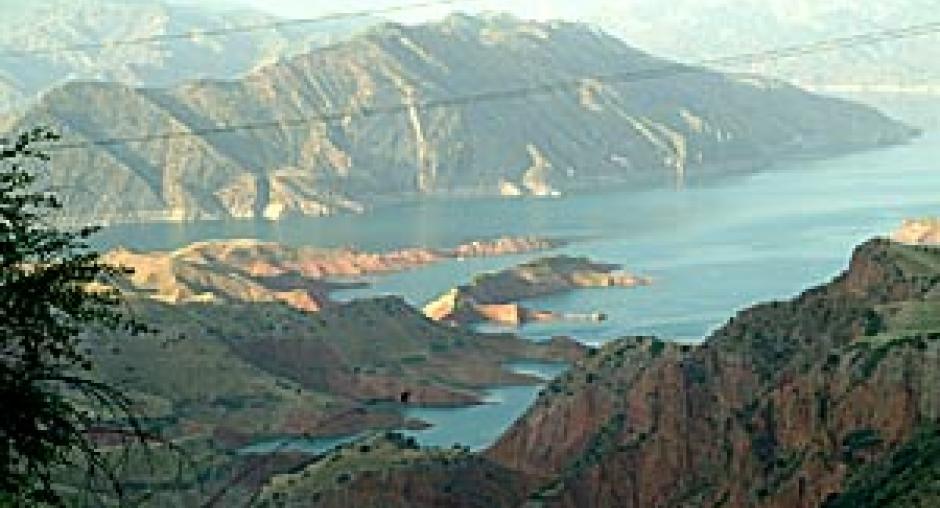Newsroom
OSCE Centre launches environmental campaign in Tajikistan's remote Rasht valley
GARM 4 August 2004

(OSCE/Astrid Evrensel)Beautiful lake scenery of the Norak Dam, south of the Tajik capital, Dushanbe, July 2004. (OSCE/Astrid Evrensel) Photo details
GARM, 4 August 2004 - An awareness-raising campaign for the protection of the environment and bio-diversity in central Tajikistan's Rasht Valley was launched yesterday by the Garm Field Office of the OSCE Centre in Dushanbe.
The project is aimed at establishing a basis for co-operation and information sharing between governmental structures, public organizations and the public to promote good governance and transparency on environmental issues and threats.
It includes seminars and meetings for the public and the local authorities about environmental risks and their consequences and on the national laws and international conventions that exist to preserve the environment.
During the launching ceremony yesterday, Aleksandr Kuzmin, Head of the OSCE Garm Field Office, said that observations made over recent years reflect a lack of information among the Rasht population about the consequences of human intervention on nature.
"Great damage has been done to the nature of the valley within the last 15 years," he said. "We think it is high time to increase the awareness of people about the environment and bio-diversity protection."
A representative of the Rasht district government, Mullojon Ahmadov, said the Rasht Valley was both blessed and cursed by its wonderful nature:
"Blessed because of its rich fauna and flora, and cursed because of people's behaviour towards nature and natural resources. Not many people realize that one of the major reasons for landslides is cutting down trees and bushes on the mountain slopes," he said.
"Therefore, the OSCE's support in promoting people to care for the nature is much appreciated."
The four-month project is being implemented by the OSCE Centre in Dushanbe in co-operation with the Rasht District Committee on Environment and Forestry, and a local non-governmental organization, Kuhiston.
The project is aimed at establishing a basis for co-operation and information sharing between governmental structures, public organizations and the public to promote good governance and transparency on environmental issues and threats.
It includes seminars and meetings for the public and the local authorities about environmental risks and their consequences and on the national laws and international conventions that exist to preserve the environment.
During the launching ceremony yesterday, Aleksandr Kuzmin, Head of the OSCE Garm Field Office, said that observations made over recent years reflect a lack of information among the Rasht population about the consequences of human intervention on nature.
"Great damage has been done to the nature of the valley within the last 15 years," he said. "We think it is high time to increase the awareness of people about the environment and bio-diversity protection."
A representative of the Rasht district government, Mullojon Ahmadov, said the Rasht Valley was both blessed and cursed by its wonderful nature:
"Blessed because of its rich fauna and flora, and cursed because of people's behaviour towards nature and natural resources. Not many people realize that one of the major reasons for landslides is cutting down trees and bushes on the mountain slopes," he said.
"Therefore, the OSCE's support in promoting people to care for the nature is much appreciated."
The four-month project is being implemented by the OSCE Centre in Dushanbe in co-operation with the Rasht District Committee on Environment and Forestry, and a local non-governmental organization, Kuhiston.
